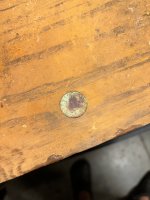reptwar1
Sr. Member
I am on a gold bearing river but the gold is so small that you can't see it unless there is an accumulation of it. It is so small that gravity methods will not work as the gold stays suspended in solution for quite some time before settling. How I came to learn this?...every panning trip, I bring back my concentrates and throw them into a clear plastic tote. One day, I decided to rest this tote at an angle on my outside ac unit. After almost a week, I looked in the bottom corner of the tote and saw a 1/4" x 4" line of gold gleaming in the sunlight. Now, this is only from maybe 2 lbs of material so extremely rich. The problem is...it's so small, that it stays suspended in water. I have precipitated gold from aqua regia in the past as well as AP solutions so would SMB precipitate these tiny particles from water?
Upvote
2






